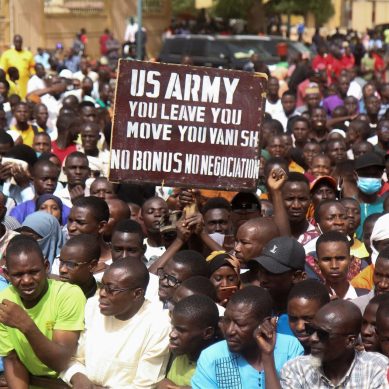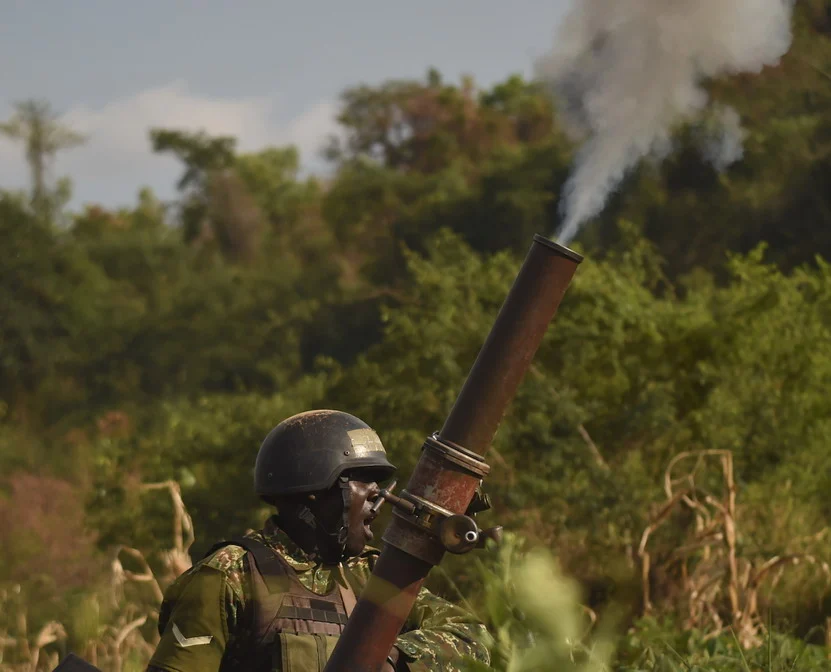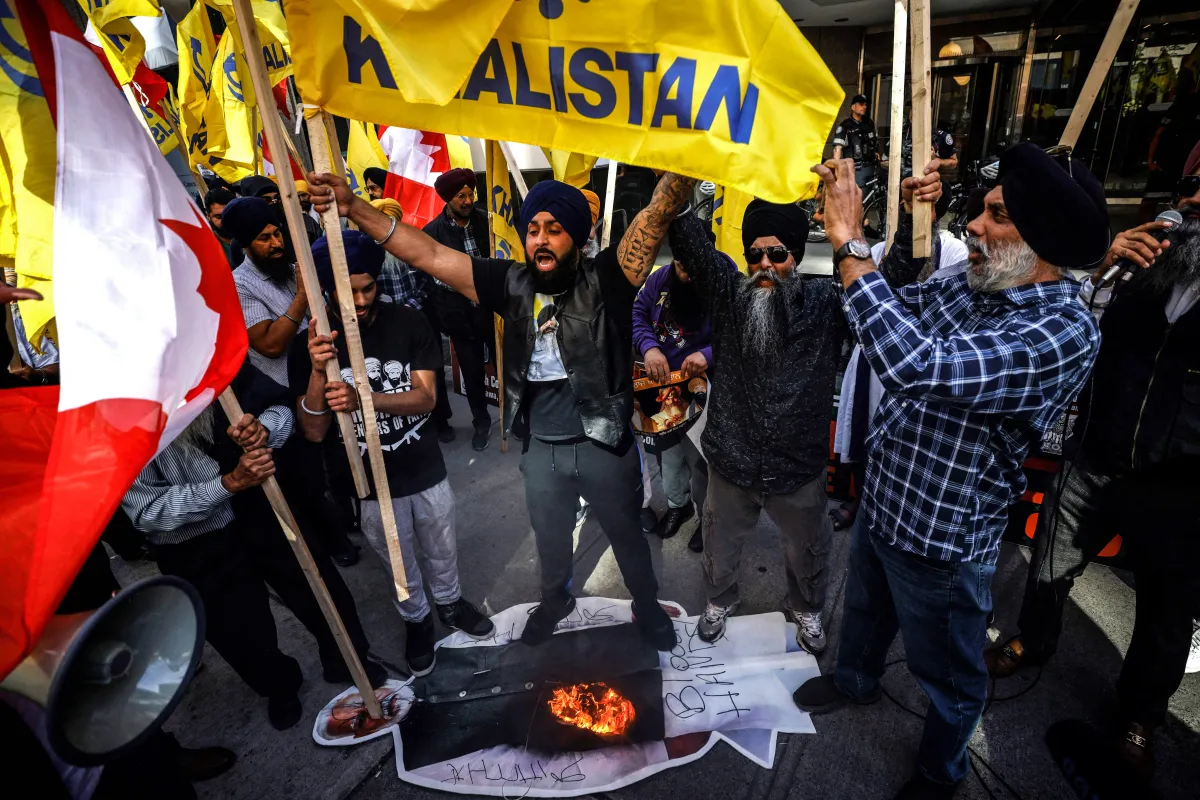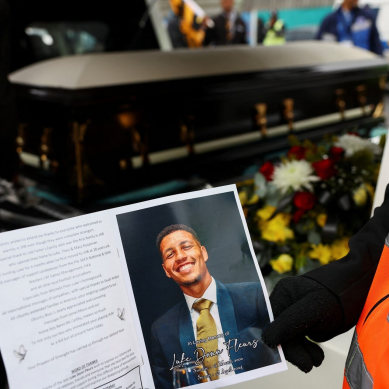
The Indian government instructed its consulates in North America to launch a “sophisticated crackdown scheme” against Sikh diaspora organisations in Western countries, according to a secret memorandum issued in April 2023 by India’s Ministry of External Affairs. The memo lists several Sikh dissidents under investigation by India’s intelligence agencies, including the Canadian citizen Hardeep Singh Nijjar, according to The Intercept, which cites a report in its possession.
“Concrete measures shall be adopted to hold the suspects accountable,” the memo says. Nijjar was murdered in Vancouver in June, two months after being named as a target in the document, a killing the Canadian government said was ordered by Indian intelligence.
The memo addresses India’s growing concerns about its reputation due to activism from Sikh dissident organisations and portrays its political enemies as extremist or even terrorist organisations. Titled Action Points on Khalistan Extremism, using the name Sikh activists use for a separatist state, the document lists several Sikh activist organisations it blames for engaging in “anti-India propaganda,” as well as acts of “arson and vandalisation” targeting Indian interests in North America.
The document instructs officials at its consulates to cooperate with Indian intelligence agencies to confront the groups Sikhs for Justice, Babbar Khalsa International, Sikh Youth of America, Sikh Coordination Committee East Coast, World Sikh Parliament, and Shiromani Akali Dal Amritsar America. It suggests that Nijjar and several other “suspects” are affiliated with one of these groups, Babbar Khalsa International. Babbar Khalsa International is proscribed as a terrorist organisation in the US and Canada, but the other organisations named in the document are considered legal in both countries.
A leader of one of another of the listed groups, Sikhs for Justice, was the target of an Indian assassination plot, according to federal prosecutors in the US. The indictment, unsealed last week, accused Nikhil Gupta, an Indian national, of working with Indian officials to kill Sikhs for Justice general counsel Gurpatwant Singh Pannun, an American citizen based in New York.
The leaked April memo from India’s Ministry of External Affairs does not explicitly order the killings of Sikh activists. Instead, it calls on Indian consular officials operating in the US and Canada to work in cooperation with India’s Research and Analysis Wing, a foreign intelligence agency; the National Investigation Agency, a counterterror police force; and the Intelligence Bureau, an internal security agency akin to the FBI. Aside from Nijjar, a number of people accused in the document of having ties with BKI are believed to be based in Pakistan or currently incarcerated in India.
The Indian government did not respond to a request for comment prior to publication of this story. Following publication, the Indian government released a statement saying “there is no such memo.” “We strongly assert that such reports are fake and completely fabricated,” Indian spokesperson Shri Arindam Bagchi wrote. “This is part of a sustained disinformation campaign against India,” the spokesperson continued, also questioning The Intercept’s previous reporting: “The outlet in question is known for propagating fake narratives peddled by Pakistani intelligence. The posts of the authors confirm this linkage. Those who amplify such fake news only do so at the cost of their own credibility.”
While the US and Canada have both now charged India with orchestrating assassinations against Sikhs in the West, the secret document obtained by The Intercept is the first public evidence showing that the Indian government was targeting these specific Sikh diaspora organisations and dissidents.
Those involved in Sikh diaspora advocacy said that the Indian government frequently characterises any political activity by Sikh separatist organisations as militant or extremist in nature.
“The Indian government and media consistently aim to manufacture a narrative that describes any type of political advocacy for Khalistan or Sikh sovereignty as ‘Sikh extremism’ as a pretext to justify a repressive security-based response,” said Prabjot Singh, an activist and editor of the Panth-Punjab Project, a digital platform focusing on Sikh politics and sociopolitical issues. “It’s important to recognise that this is a strategy that India employs in Punjab to justify crackdowns on Sikh political organising, while misusing diplomatic resources abroad to try and enlist other countries as partners in this effort.”
India’s crackdown on Sikh activists comes in response to an ongoing campaign advocating for the creation of an independent Sikh state in the Indian province of Punjab. During the 1980s and 1990s, a conflict over separatism in Punjab claimed the lives of thousands of Sikhs and others before the insurgents were crushed by the Indian military.
The counterinsurgency involved widespread human rights abuses by Indian security forces, as well as acts of terrorism by separatist militants, including, most notoriously, the deadly bombing of an Air India flight in 1985.
While Sikh separatism has largely been suppressed inside India, the cause has continued in the diaspora as a political movement that organises protests and lobbies against the Indian government with the aim of holding referendums in Punjab. The Indian government has complained about the activities of diaspora Sikh activists to the Canadian and US governments, often accusing these groups of terrorism.
The secret Ministry of External Affairs memorandum focuses its justifications for the crackdown against Sikh dissident groups on perceived reputational harm from their activities, as well as concerns about the influence of Sikh organisations in Western politics. Under a section labelled “Khalistan Extremism,” the document blames Sikh diaspora organisations for “defaming Indian government of so-called torturing, murdering and disappearing thousands of Sikhs” and “attempting to degrade India’s international image.”
Sikh activists have held major protests at Indian diplomatic missions in Western countries in recent years, some of which have involved provocative denunciations of Indian government officials and vandalism of diplomatic buildings. India has criticised the alleged failure by Western governments to defend its consular staff from perceived threats and harassment during such demonstrations. The document notes with concern the impact of these protests, while suggesting that the Khalistan activist movement is being assisted by public officials in Western countries.
“The pro-Khalistan organisations have become obviously more extreme,” the document says. “Their strategy has gradually shifted from narrative building to street protests, and inputs from our missions indicate that top officials of pertinent countries have provided a guiding hand in pro-Khalistan campaign which has posed a grave challenge to our global interests.”
Ties between India and Western countries have warmed in recent years, owing to a shared interest in containing China. Yet suspicions and tensions in the relationships remain, as the memo indicates. The document expresses the belief that Western politicians may be refusing to crack down on Sikh activists to exert pressure on India on other subjects, including its neutral stance on the Russian invasion of Ukraine.
“Notably, we have raised our concerns about those elements to the US and Canada constantly. But they keep using human rights and freedom of speech as pretexts, asserting that these organisations have not committed any crime within their territories,” the memo says. “Although the relation between India and the West continues to gain momentum, the Khalistan issue has become a subtle leverage. While depicting India as a strategic partner to contain China and Russia, the West keeps utilising Khalistan as a geopolitical tool to squeeze India amid the Russia-Ukraine conflict.”
The classified memo is signed by Vinay Kwatra, India’s foreign secretary, and listed for distribution to several Indian consulates in North America. Kwatra’s signature was analysed by a forensic handwriting expert and found with high confidence to match records of his signature in other, publicly available documents.
US and Canadian officials have issued statements indicating that shared intelligence, including intercepted communications of Indian government officials, allowed them to determine that India was involved in Nijjar’s murder. Unsealed court documents in the murder-for-hire plot targeting Pannun likewise indicate significant US government interception of electronic communications between Indian officials and people working on their behalf in the US.
- The Intercept report











